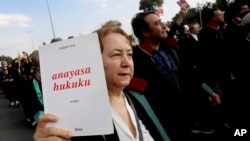Bar associations across Turkey reacted with demonstrations, marches and legal actions Friday to a constitutional crisis in which a lower-ranking appeals court filed an unprecedented criminal complaint against Supreme Court judges over their decision to release a jailed parliamentarian.
Parliamentarians from opposition parties have started a "justice watch" campaign, refusing to leave the parliament until the issue is brought to the floor for discussion, while President Recep Tayyip Erdogan caused further consternation Friday by weighing in on the side of the lower court.
Can Atalay, a Turkey's Workers Party (TIP) parliamentarian representing the southern province of Hatay, has been held in custody since April of last year when a local court charged him with "assisting the overthrow of the government" during the Gezi Park protests of 2013, the largest protests against Erdogan's government.
Others charged in the case include renowned businessman Osman Kavala, academic Tayfun Kahraman and journalist Cigdem Mater.
Lawyers for Atalay, 47, took his case to the Supreme Court, where nine of the 15 judges ruled on October 25 that the MP's imprisonment breached his rights "to be elected" and "to have personal freedom and security."
Immediate uproar
But rather than comply with the ruling, the local court that first charged Atalay took the case to the Court of Cassation, the nation's highest appeals court, which responded on Wednesday by filing a criminal complaint against the nine Supreme Court judges.
That action, in apparent violation of the Turkish Constitution, prompted an immediate uproar from opposition politicians, among others.
At the call of the main opposition party CHP, several MPs remained seated in the parliament overnight Thursday, demanding that the speaker of the parliament, Numan Kurtulmus, bring the issue to the floor.
Several opposition leaders, including the head of TIP, Erkan Bas, and CHP's newly elected chair, Ozgur Ozel, described the Court of Cassation's action as a "judiciary coup attempt."
Holding a copy of the constitution in his hand during his speech delivered to the Turkish Grand National Assembly, TIP leader Bas referred to the constitution's relevant article, reading out the phrase "Supreme Court's decisions are final and obliges all."
"This is a point where law has vanished, we are faced with a judiciary coup, loud and clear," Bas said, concluding his speech by emphasizing this was a "threat faced by all citizens of Turkey that needs to be repulsed."
Erdogan, meanwhile, entered the debate for the first time Friday, seeming to come down in support of the lower court.
"Firstly, I guess, nobody can deny that the Court of Cassation is also a high court. Unfortunately, the Supreme Court has come to a point where it has been making mistakes, one after another, in this regard. And, this seriously saddens us," Erdogan said.
As criticism of the president's comments grew, he made another statement asserting he was "not taking sides but rather acting as an arbitrator as the head of the state."
However, independent analysts were not persuaded by Erdogan's disclaimer.
"Erdogan is not outside of this judiciary game. He is absolutely not inactive," said Ismet Akca in an interview with VOA Turkish. Akca is a former professor of political science at Turkey's Yildiz Technical University and a former nonresident scholar at the Carnegie Middle East Center. "He is an actor in this game. As always, he first watched everything, he waited, and then, he delivered his position."
Warning about Turkish commitment
Ibrahim Kaboglu, a retired law professor from Marmara University and former MP from CHP, told VOA Turkish that as president, Erdogan "has a constitutional duty to ensure the constitution is abided by" and warned that the crisis could feed into growing doubts about Turkey's commitment to constitutional rule among its Western allies.
The challenge to the constitution has alarmed the country's lawyers, hundreds of whom gathered in Ankara on Friday at the bidding of the Union of Turkish Bar Associations and marched on the Court of Cassation demanding "respect for rule of law."
Addressing the crowd, the organization's president, Erinc Sagkan said, "We have expressed to the public that the crisis we have been going through for the past two days cannot be defined as a simple judiciary crisis, that it is a major state crisis. Unfortunately, the constitution is being breached with the hands of judiciary itself."
Several local bar associations have also filed criminal complaints against the Court of Cassation for its refusal to abide by the Supreme Court decision.
Speaking to VOA Turkish, Ankara Bar Association head Mustafa Koroglu said a lower court refusing to comply with a Supreme Court decision "stands as a first in legal literature."
"In the history of law, constitutional courts are the courts that have been established to eliminate fascism," Koroglu added.
"Today in Turkey, the Supreme Court is being accused. Where is the rule of law and where is Turkey being dragged to with fascism and similar systems?"
VOA Turkish's Burcu Gündoğan in Washington contributed to this report.





